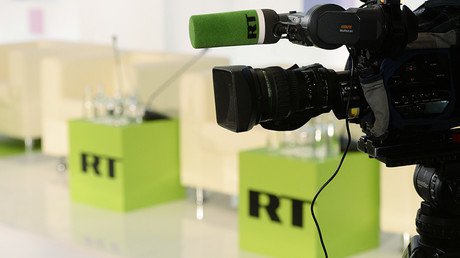The Russian Embassy in the US has lashed out against the State Department’s remarks which understates the significance and potential consequences of Washington’s demands for Russian media to register as “foreign agents.”
In September, the US Department of Justice ordered RT America to register under the Foreign Agents Registration Act (FARA), or face consequences that could effectively stop work at their US offices.
While the news channel is challenging the ultimatum, the issue of applying the 1938 legislation – enacted to tackle Nazi propaganda – to Russian news outlets, has been making headlines around the world.
On Tuesday, the US State Department downplayed the severity of possible restrictions Russian news outlets could face if it registered as ‘foreign agents.’
“When the United States tells someone to register under a foreign agent requirement, we don’t impact or affect the ability of them to report news and information. We just have them register. It’s as simple as that. Russia handles things very differently. But all they have to do is register, and it’s a pretty simple process, okay?” Heather Nauert, State Department's spokeswoman said Tuesday.
The Russian Embassy in the US immediately responded, noting that it will in fact “significantly hamper the work and create problems for journalistic teams,” since the application of FARA legislation will require the disclosure of confidential data, including a list of employees and their personal information.
“Regarding the registration procedure of a foreign agent in the US, its consequences are not as formal and painless as follows from Ms. Nauert’s words,” the embassy pointed out.
READ MORE: No such thing as shame in Washington when the subject is Russia – media executive
The diplomatic mission reiterated the comments made by President Vladimir Putin at the Valdai Forum last week, where he promised a “symmetric, tit-for-tat and swift” response to any American interference in Russian media activity in the US.
“Moscow has already announced the inevitability of a mirror response to the possible actions of the US authorities in relation to Russian media in the United States. Based on the relevant provisions of Russian Media Law, similar measures will be applied to the American media in Russia. But this is not by our choice,” the embassy said in a statement.
The embassy also dismissed Nauert’s criticism of Russia’s own legislation, introduced five years ago, which requires foreign non-governmental organizations that are engaged in political activity to register as ‘foreign agents’ in Russia.
“The main difference between the Russian law and the American one is its universality,” the embassy said. “As practice has shown, the American law application is purely selective and politically motivated. This is confirmed by the absence of [the] largest media, funded by other Western countries, in the US list of foreign agents.”
Overall, the embassy said, the persecution of Russian media in the US follows a clear trend where the “words and deeds” of the US authorities regarding press freedom diverge.
“Amid the anti-Russian fervor in Washington, they completely forgot about the principles [of press freedoms] enshrined in domestic legislation and international law,” but nevertheless keep accusing other countries of disrespecting its fundamentals, the statement said.


